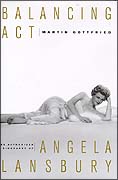|
Books
By and On Angela
Balancing
Act
The Authorized Biography of
Angela Lansbury
By Martin Gottfried
Introduction to
the book

The
author, Martin Gottfried, December 2, 1998
Introduction to the Book
I chose Angela Lansbury as the subject of a biography because
she was a brilliant actor who could well represent the courage
and vulnerability, the survivalism and grandeur, the total commitment
of all actors. As a professional drama critic, I wanted to pay
tribute to the players who had given me a lifetime of unexpected
magic. I also chose Angela Lansbury because she had become an
American icon, and so her life had a unique resonance. I chose
her, too, because, having known her for some twenty years, I was
aware that she was a fascinating and admirable woman - not just
gifted but smart, articulate and adult. She was interested in
collaborating on a book about her life as an actor, but the production
schedule of her popular television series, Murder, She Wrote,
was exhausting, and during its summer breaks, she wanted only
to rest at her second home in Ireland. When the series finally
came to an end in the spring of 1996, she wrote to say, "I
think it's time for our book." An as-told-to autobiography
was fleetingly considered, but I did not relish writing in her
voice and she wanted no part of the exposure that such books require.
This conservatism of character, I would soon learn, reflected
her profound sense of privacy, which ran deeper than mere reserve.
Nevetheless, she wanted to share her fifty years of thoughts about
and experiences with acting, she wanted to reveal the legacy inherited
from her grandfather, the British statesman George Lansbury, and
she had a philosophy to express about the importance of balance
in her life. In fact, the title "Balancing Act" came
at her suggestion. It is not related to her birth sign of Libra.
While she is mildly curious about astrology, her own balancing
act, she feels, is a conscious commitment to maintaining values
and perspective, "the balancing of the real life with the
artificial aspects of fame and success." An "authorized
biography" was the form we settled upon, and as our interviews
began, her memory proved formidable. A single question could prompt
a half hour reply that was all but formally composed in complete
paragraphs. In addition, she encouraged her husband, famiily,
friends and colleagues to speak with me freely and at length.
She gave me access to her files, papers and correspondence. She
not only assured me of freedom to disapprove of her work, she
positively relished it. While there was no discussion of approval,
I promised to show her the manuscript before publication. "If
I say it," she anticipated, "you are going to write
it. But if it is totally out of line and wrong, I'm going to tell
you." A man who is writing the story of a woman's life must
seek to understand and even explain the female sensibiity. It
is a formidable task, not dissimilar from that confronting a novelist
or playwright who is trying to create a character of the opposite
sex. The proposition is to leap the gender gap, a subject in which
Angela was particularly interested. On several occasions, she
had expressed disappointment that Jessica Fletcher, her virtual
alter-ego in Murder, She Wrote, thought "like a man."
The male writers of the show, she felt, "just [didn't] get
it." During one of our interviews, she glanced up, raised
a quizzical eyebrow in my direction and added, "I'm not so
sure that you get it either. I see that mystified look on your
face." As a biographical subject, she posed others problems.
Her public image was practically saintly while, in my experience,
the best subjects were not only dead males but mean and nasty
ones. Interesting men and women - powerful, successful or accomplished
ones - usually develop aggressive egos. Smart people tend to be
opinionated, or impatient, even downright unlikable - but they
are fascinating, while nice people can be so bland. Lansbury gave
the lie to that. She is intelligent and decent, as warm, honest
and mature as she seems on television, but she is also tough,
sharp witted and funny. And complicated. In short, she is a layered
person who reveals herself carefully and only when she has fully
prepared the entrance. It is small wonder that she is a character
actress. Here then, is a woman who has not only kept her personal
life from being overbalanced by a very public life; she has also
kept a specific set of personal values in balance with a profound
commitment to acting. That commitment is based on a shining talent
which she believes was simply given to her by the gods, It is
a talent she considers her emotional foundation, "a rock
of stability at the center," and she feels the presence of
this talent the same way we might know that we are right or left
handed. She describes it matter-of-factly as "a repeating
ability to produce a result which kept me always in the forefront
artistically if I was doing something that was meaningful and
had substance." And so she is neither falsely modest, which
would insult the talent, nor does she take it for granted, which
would abuse it. "Having that rock at the center," she
told me, "has been my salvation, because even though, to
outward appearances, mine has been a life filled with success
and happiness and joy and laughter and attainment, what was going
on behind the apparent joys and happiness was in turmoil in my
private life. The only way I could deal with it was by having
this rock which represented stability. The one thing I knew that
was right and true and possible." As might be expected, she
is a tough judge of her own work. Although she has had an immensely
productive career, she frets that she might have done more, particularly
on the stage, which is the medium she takes most seriously. And
she plans to do still more there. She also continues to crave
a great leading role in a major movie - something she feels she
has never had. It is as if she is still hurting from those early
years in Hollywood, when she was routinely relegated to playing
secondary roles. As for the vast body of her movies and television
films, I have dealt with only those which, from my point of view,
were most relevant to her work or life.. This is a biography,
not a resume. A full listing of her stage, film and television
work is at the end of the book. Angela Lansbury has had a career
of astonishing and perhaps unparalleled success in three media,
each at a climactic time in its history. She was a movie actress
for two decades in the glory days of the Hollywood studio system.
She was a Broadway leading lady in the last decade of glamorous
musical comedy. She was a television star in the final era of
network dominance, when an audience of many millions could still
be held in thrall in a nationwide living room. It was of course
in the television series "Murder, She Wrote" that she
became one of the best loved and most admired women in America
- indeed, in the world, and yet she has remained her own person.
She told me at the outset, "I want it to be believable, and
not a whitewash. I've got my problems and I know that. I'm not
the easiest person to live with." When she read the manuscript,
she certainly did tell me where she thought it was "wrong"
or simply too invasive of her family's privacy, but never, not
once, did that relate to herself, personally or professionally,
nor did she ever complain about how she was characterized. It
was the privacy of her husband, her children and her grandchildren
that concerned her. As for herself, she has a personal aversion
to flattery. After one particularly draining back-and forth, I
half-joked that I'd send her two dozen roses in the morning. "Don't
give me that bullshit," she snapped, "You're dealing
with a 74 year old battle-ax."
[ BACK
TO THE PREVIOUS PAGE ]
|





